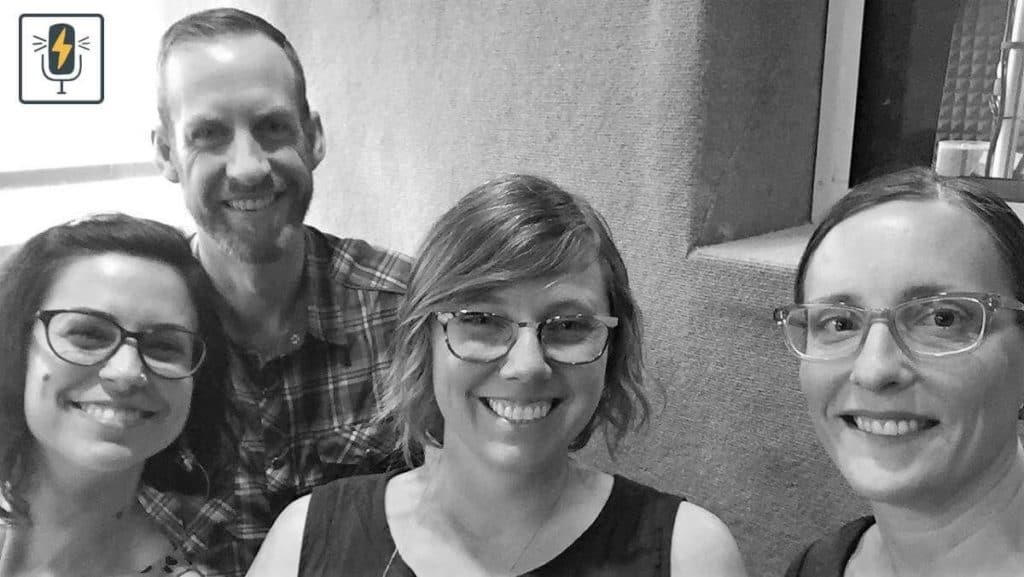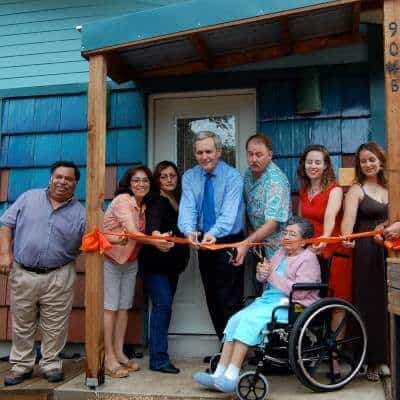Episode 19 | September 25, 2018
How is Austin Community Design & Development Center (ACDDC) strengthening communities through civic engagement? Executive Director Nicole Joslin, RA, LEED AP, and Program Coordinator Dr. Marla Torrado, PhD, stopped by the show to explain. They are working to empower neighborhood residents to create a higher quality of life, whether they are recovering from a natural disaster or ensuring affordable housing in growing cities.
ACDDC engages with communities and brings together partners to create affordable housing and sustainable environments. Whether it applies to rebuilding after natural disasters or addressing resident displacement and affordable housing in rapidly growing cities, working together to create spaces that work for everyone is the solution.

A Shared Passion Born from Different Experiences
Nicole and Marla forged their passion for community building and civic engagement through profound experiences across the Americas, and together they are a powerful force for change in Austin.
After completing her architecture degree, Nicole went to Biloxi, Mississippi to help rebuild homes after Hurricane Katrina. “I got there and said I’m going to put some houses on the ground and it’ll be great,” Nicole says, but she quickly realized that “there’s a lot more to recovery, to sustainable communities, to making an environment that works for people, than just the building. Ever since then I’ve been drawn to places where I can think more comprehensively about communities. Of course it’s about good buildings, but it’s also about good places and people having a voice in how those places are shaped.”
Dr. Torrado holds degrees in the fields of environmental science, geography, and community and regional planning. Her fieldwork has spanned Puerto Rico, Guyana, and Argentina. She says that growing up on the island of Puerto Rico honed her early interest in the environment, but she also understood that “there was more to the story about how development impacts an area than just looking at the environment.” Her research into human-environment interaction eventually led her to pursue “grassroots level community planning that is good for both the community and the environment.”
Together at ACDDC, the pair first listen to community members to jointly determine their needs, and then they identify they programs, departments, and connections that can help fulfil those needs.
Stories of Shared Success, After Disasters…
Nicole cites the community design center in Biloxi, which is supported by Mississippi State University, as an example of successful post-disaster recovery. In addition to addressing the immediate post-storm needs, they set their goals for the future even higher than the past. They fostered civic engagement to plan for even more ambitious housing, economic development, and green infrastructure than what was there before the storm.
In Marla’s experience, the projects that create positive, long-term, sustainable change are those with grassroots community involvement. She sees that happening now with a rebirth of community organization in isolated areas of Puerto Rico. People are fired up, organized, and committed to change. That includes taking control of meeting their needs, for example installing solar panels to reduce their reliance on the unpredictable electricity grid. Marla says that “strong community leaders who bring people together, have a voice, and then move things forward” are the secret sauce for a successful community.
Closer to home, residents of the Williamson Creek area of south Austin were impacted by flooding a few years ago and are now experiencing property buyouts. They see an opportunity to turn the vacant land into a neighborhood amenity but also want to understand the community impact and avoid displacing residents in the future. Nicole says that ACDDC is “working with residents now to create a vision for that area that works for everybody.”
…And Everyday
“Disasters are an easily galvanizing event,” notes Nicole, which tend to naturally get people involved and interested in being part of the decision-making process. However, Austin is facing many other seemingly less dramatic challenges related to affordable housing and displacement pressures in different neighborhoods, which Nicole says have also been “a galvanizing force for community action.”
One example is a new East Austin project for which ACDDC is a consultant. The project was initiated to protect and expand affordable housing. However, they learned through community conversations and meetings and focus groups that the neighborhood’s residents had other, even more pressing needs related to affordability and a high quality of life. Nicole says they realized that “if we’re not addressing those things then we’re never going to get to our goals of providing the affordable housing that’s needed.”
Now, ACDDC is collaborating with multiple stakeholder groups to increase residents’ awareness of and access to additional services and programs available through non-profits and city agencies. They are also working with city departments and UT-Austin to help direct research towards the greatest needs. Nicole recognizes that ensuring awareness of and access to existing programs and services is important before designing new ones.
Most importantly, explains Nicole, is that the residents must have a seat at the table when “deciding what new things need to be created that could really help them.” The nature of ACDDC’s work is listening to and working alongside members of the community: “It’s not only us,” Marla says. “It’s us together with the community and with all the other partners that we have.”
Looking Forward
ACDDC believes that great things are ahead for Austin as it continues to grow. All that is required is for each of us to get involved and to pursue goals that benefit the community not just individuals.
According to Nicole, “We’re at a point in Austin where we definitely have a chance to make good decisions as a community, but it’s going to take people stepping up and participating in that conversation, voting for things like affordable housing bonds in November, talking to their council member about what they really care about and what they think is best for their community.”
Marla is hopeful. “We’ve seen lately higher engagement from many different neighborhoods around different topics, and as long as people keep engaged we’re definitely moving in the right direction.”
You can participate in building a stronger Austin by getting involved in your neighborhood association, voting for affordable housing bonds in November, talking to your council member about the issues you care about, and participating in conversations about a future land development code overhaul.
In addition, you can support the great work that ACDDC is doing in neighborhoods across Austin by signing up for their annual fundraiser on November 2nd. The panel discussion with high-profile guests will be moderated by Barbara Brown Wilson (author of the book “Resilience for All”) and will be followed by a happy hour. Get more details and sign up for ACDDC’s newsletter at www.acddc.org.
LINKS AND RESOURCES
- Austin Community Design & Development Center (ACDDC)
- LEED
- AIA
- Architecture for Humanity (now the Open Architecture Collaborative) Project in Biloxi
- Community Design Studio in Biloxi, MS
- Mississippi State University
- Williamson Creek neighborhood flooding impacts (Austin-American Statesman, November 2014)
- City of Austin
- The University of Texas at Austin
- Austin Housing Coalition
- Dell Medical School
- The Nature Conservancy
- “Resilience for All” by Barbara Brown Wilson
For more great interviews with Texas business leaders who are using 21st century tools to reduce their environmental footprint and improve their profitability make sure to check tune in Texas Energy Lab Radio each week!
Tun in for our next episode with the founding partner of Genesis Park LP, Paul Hobby in which we’ll discuss Houston’s future as the Engineering (not just Energy) Capital of the World, and innovation at the intersection between water and energy.
